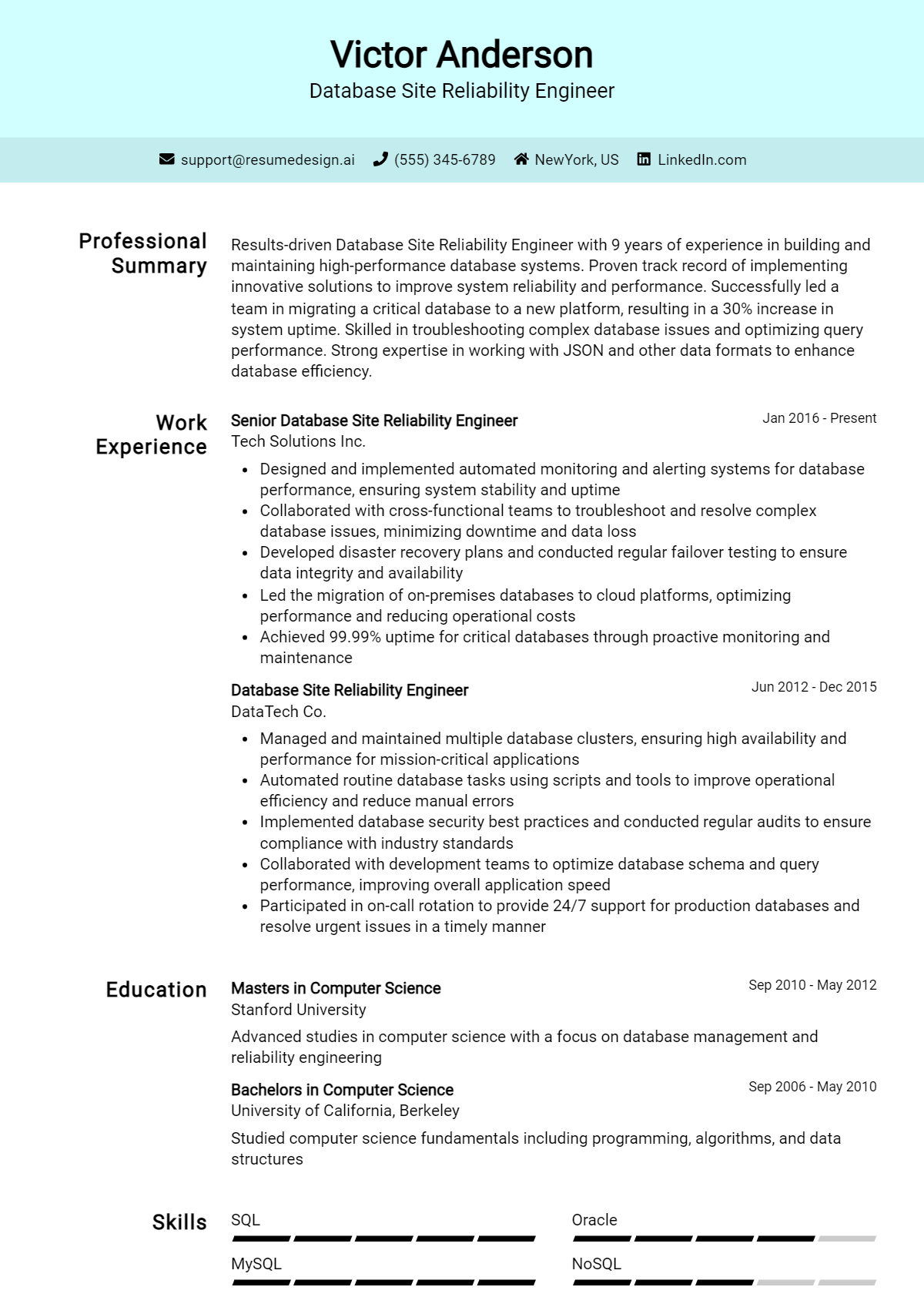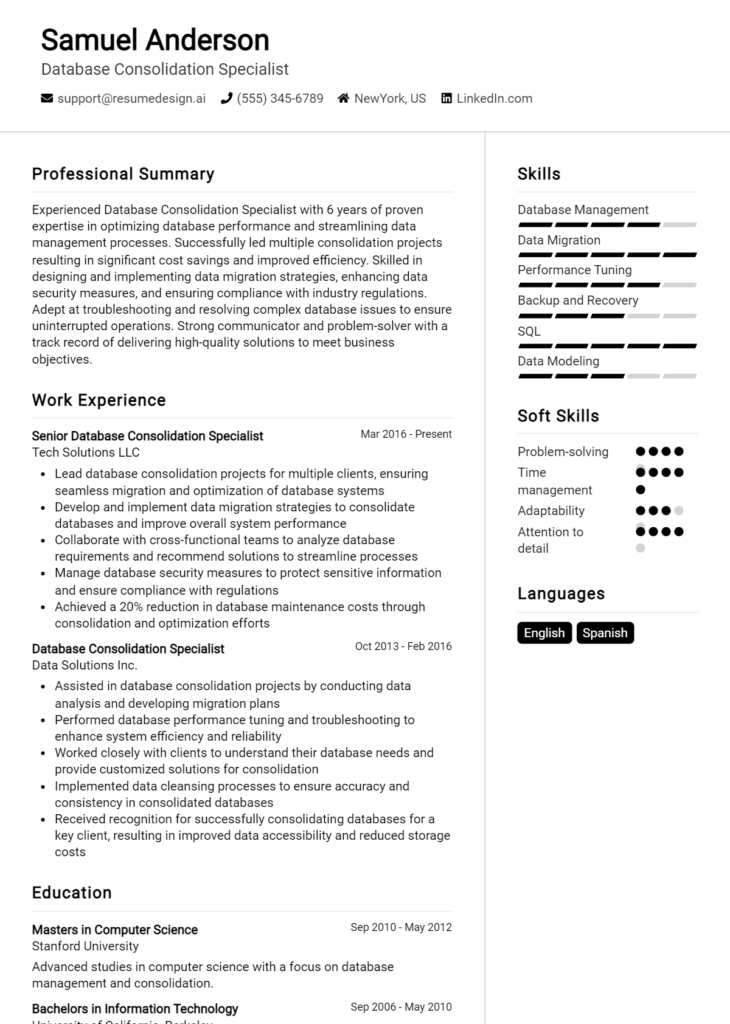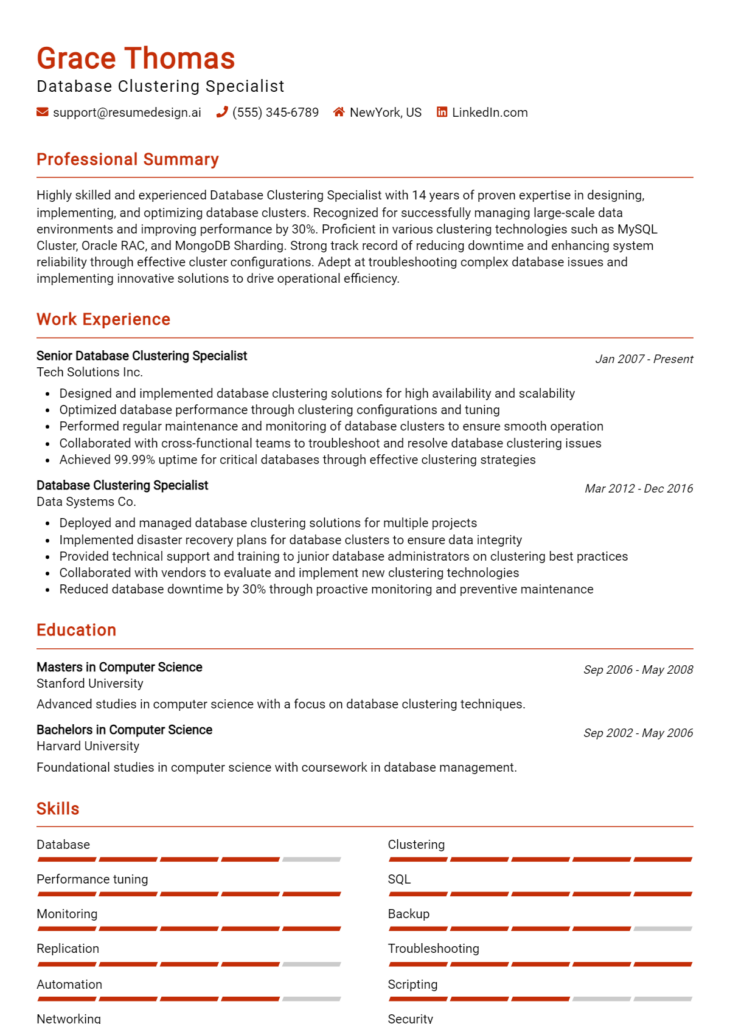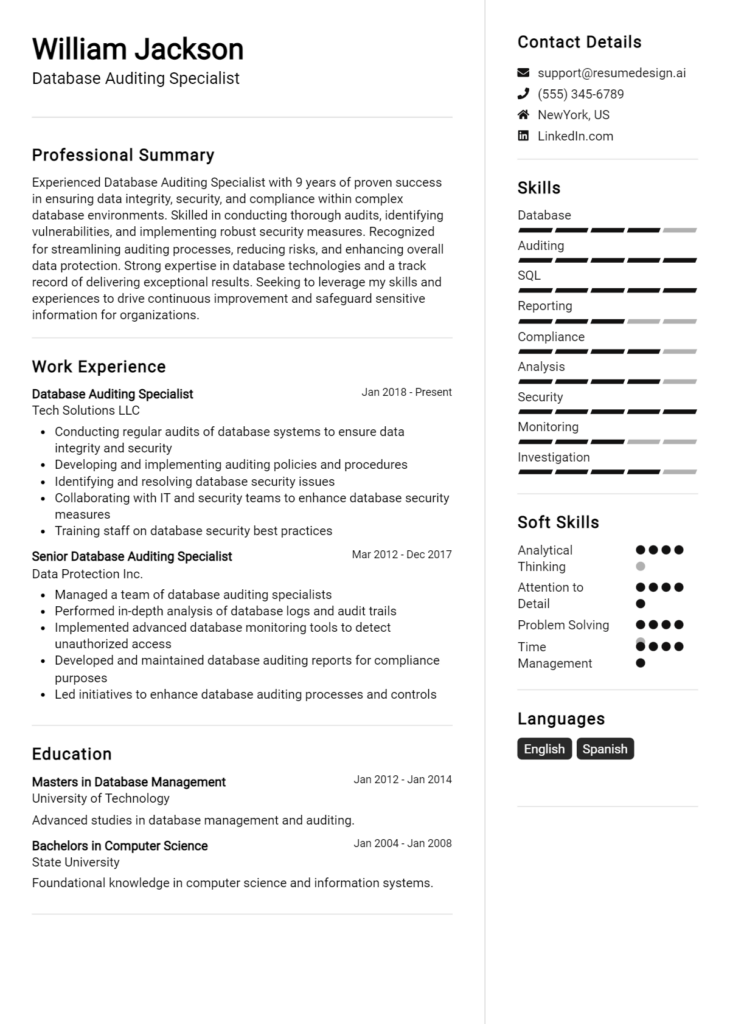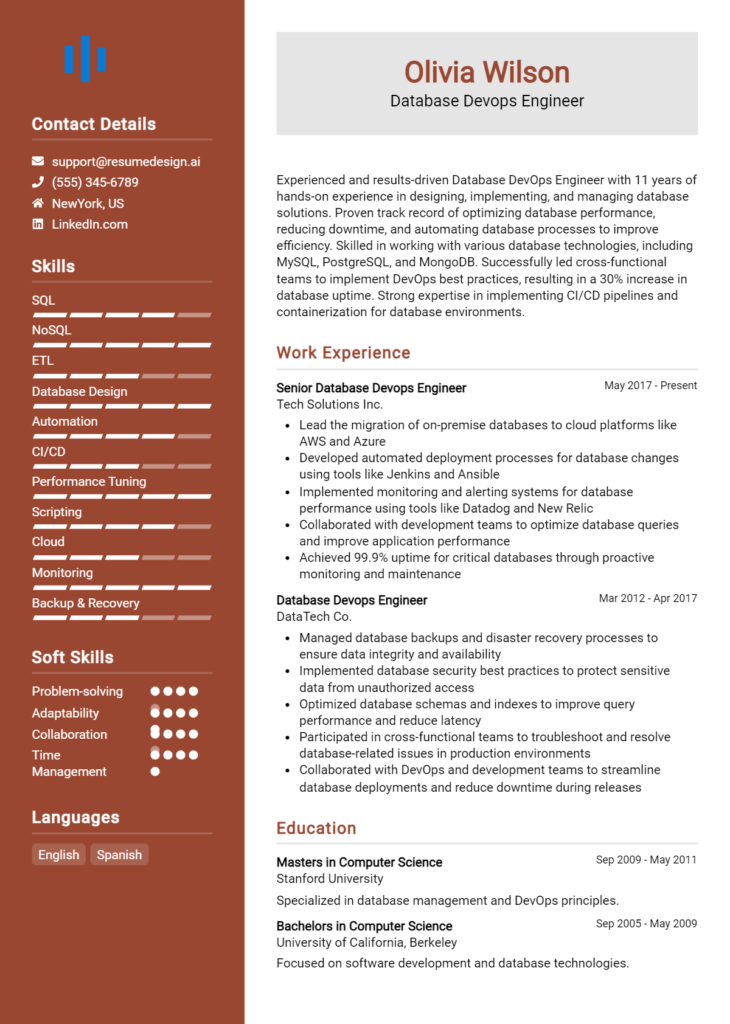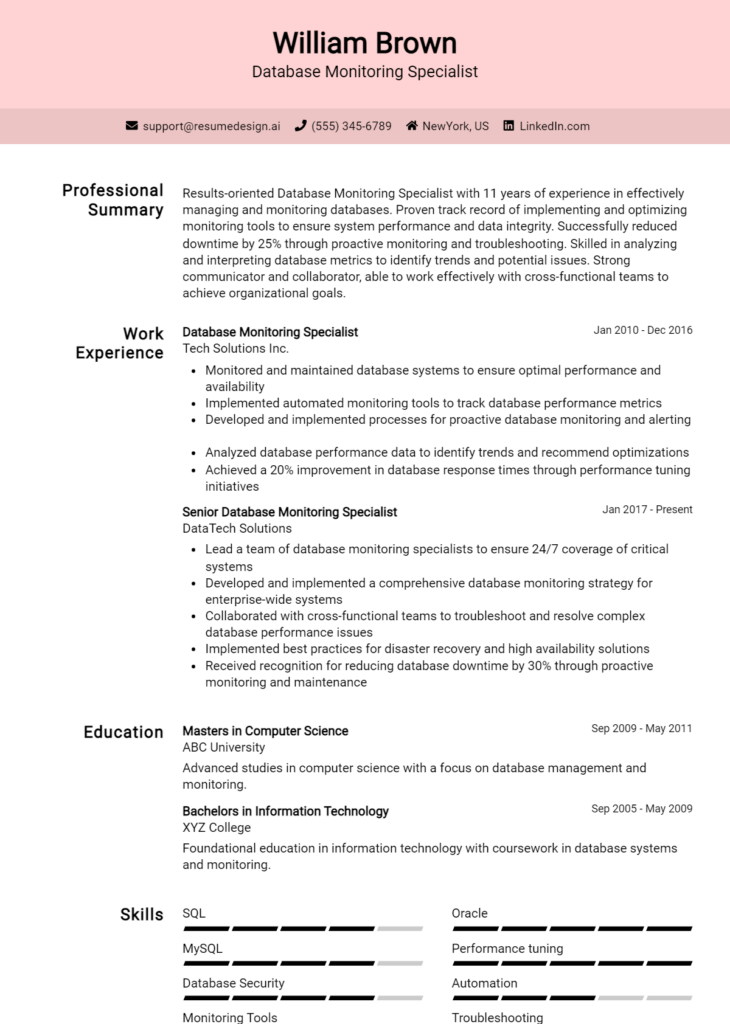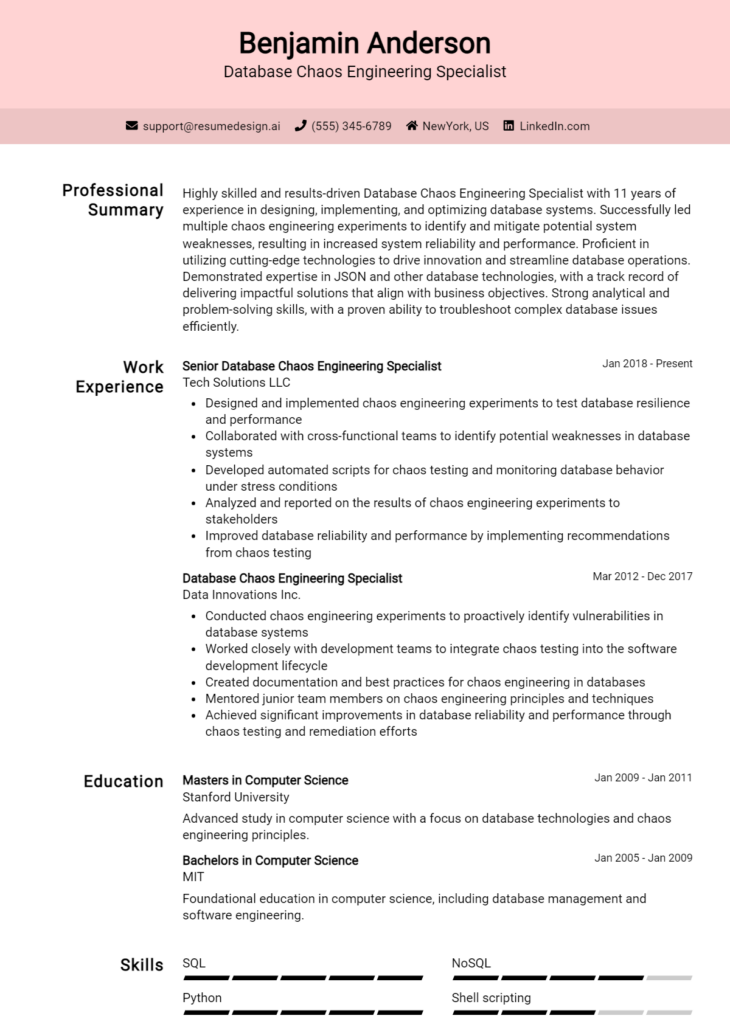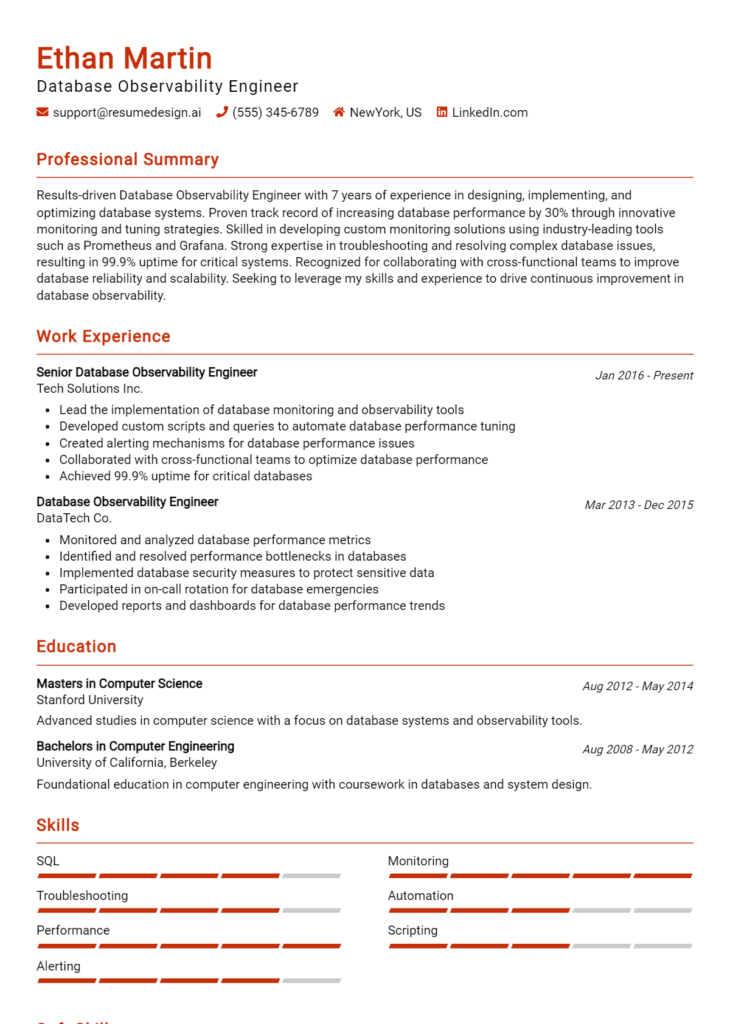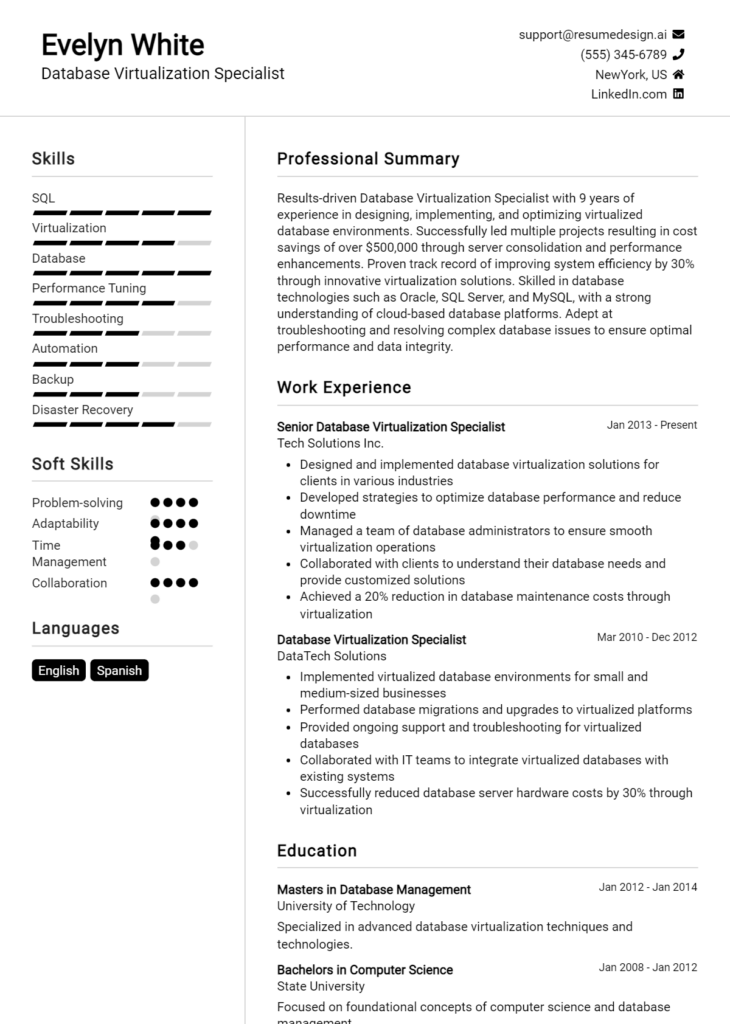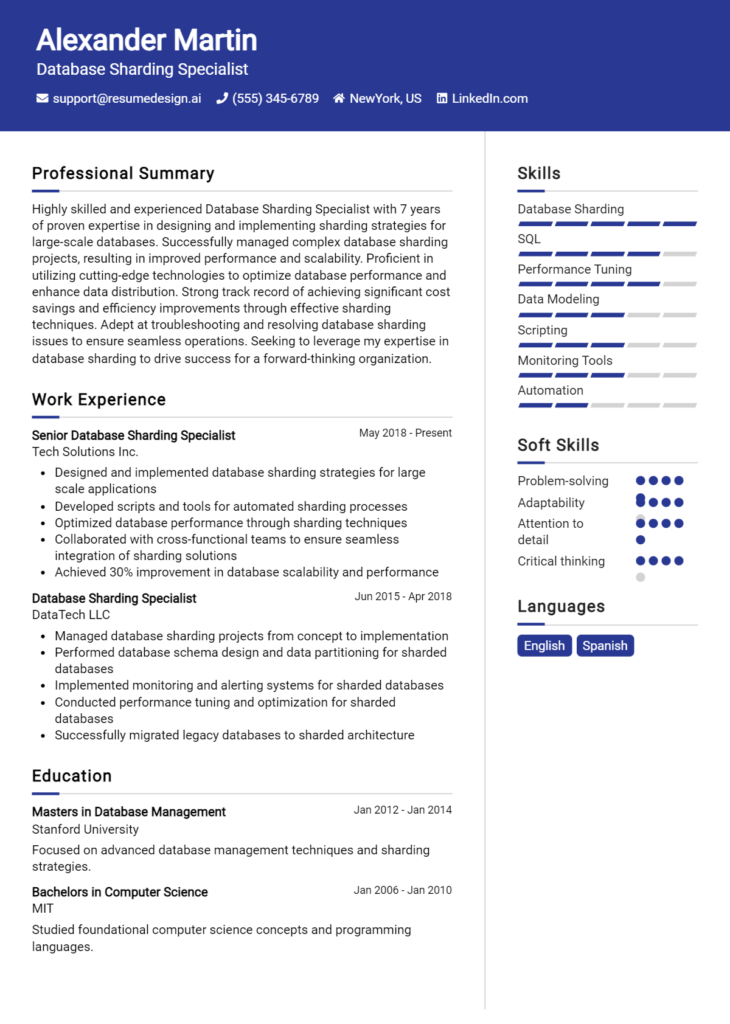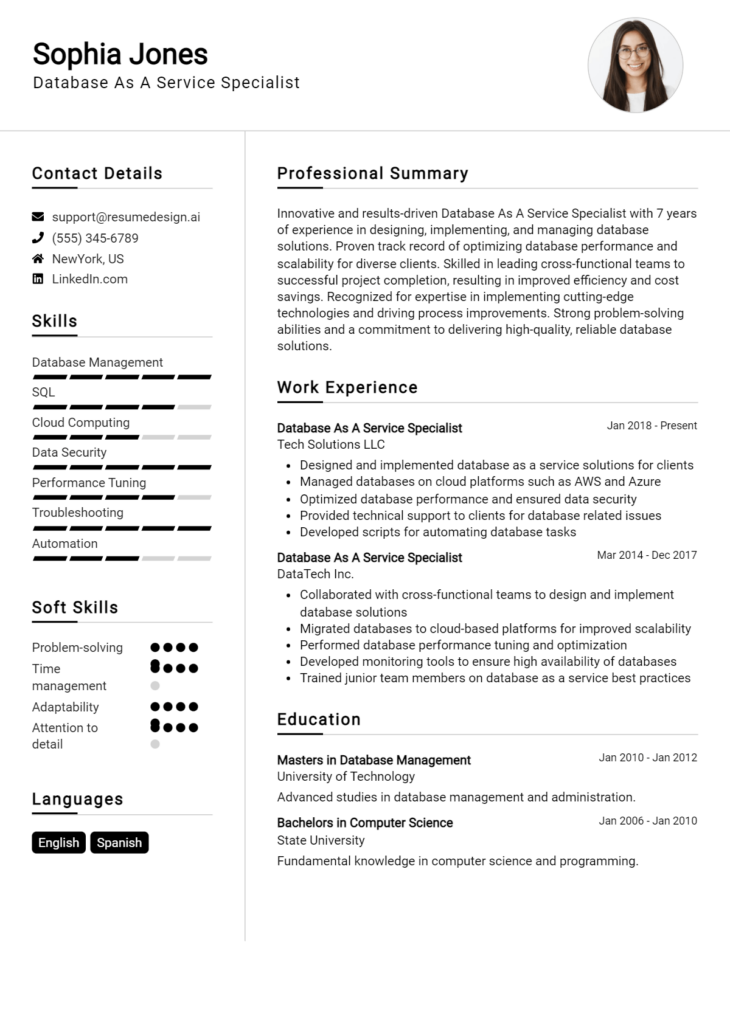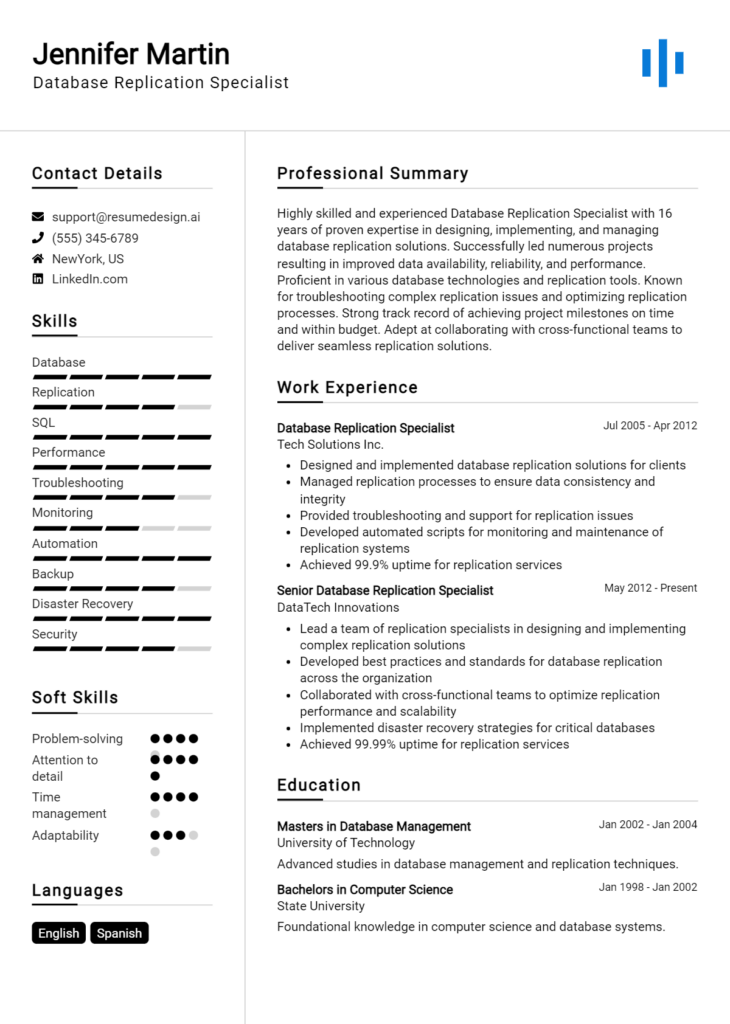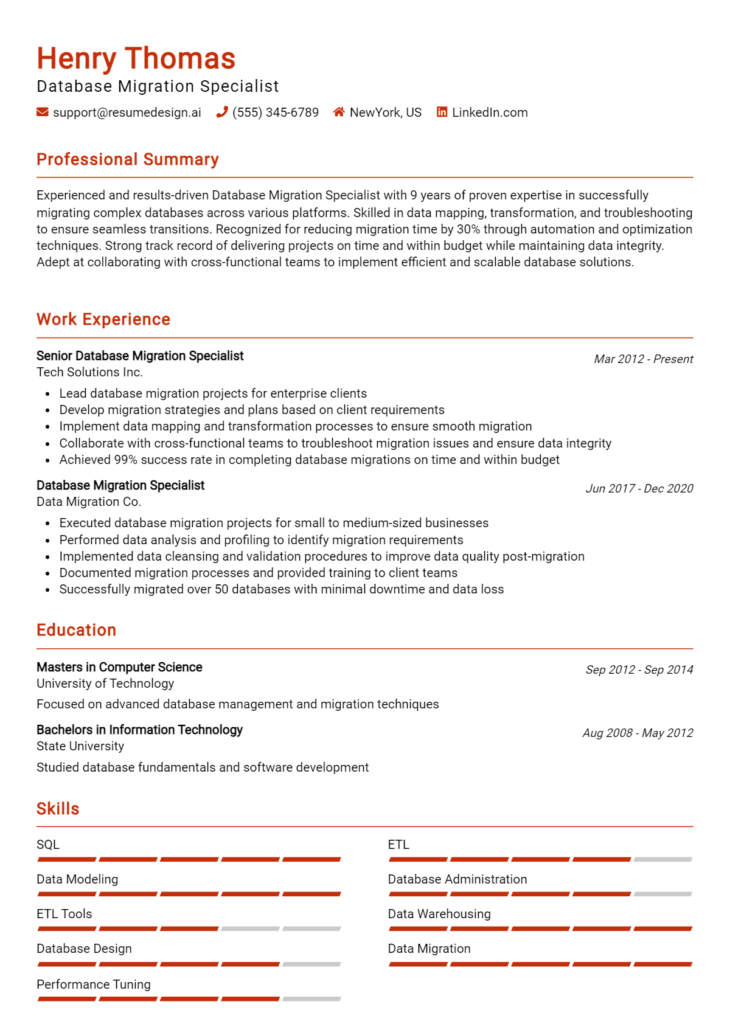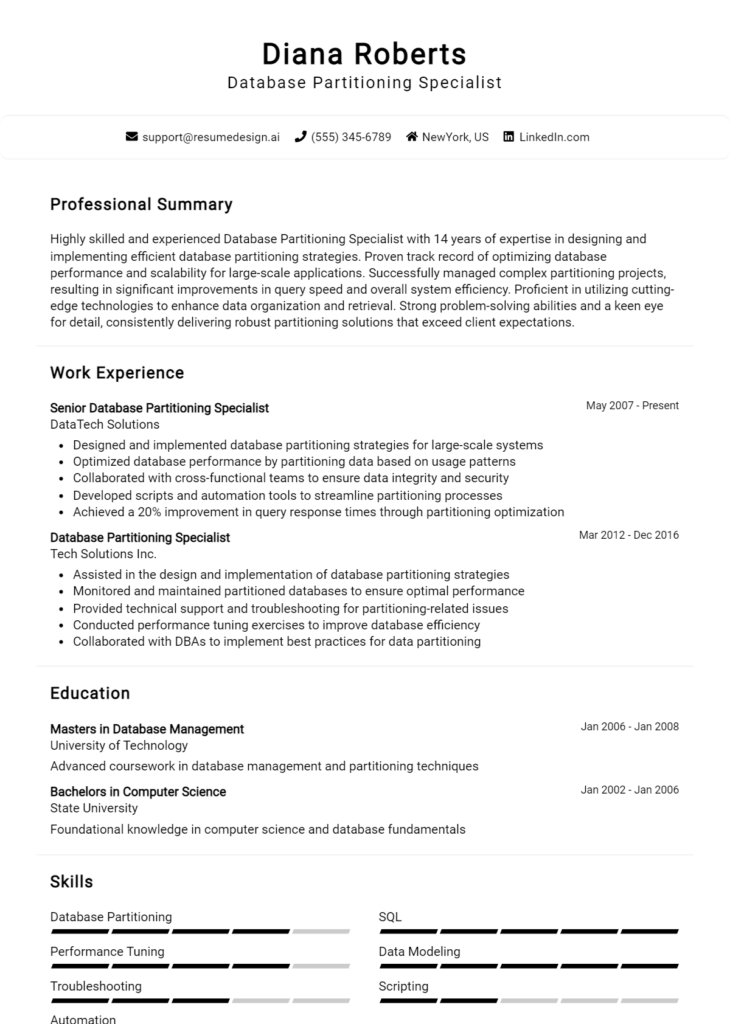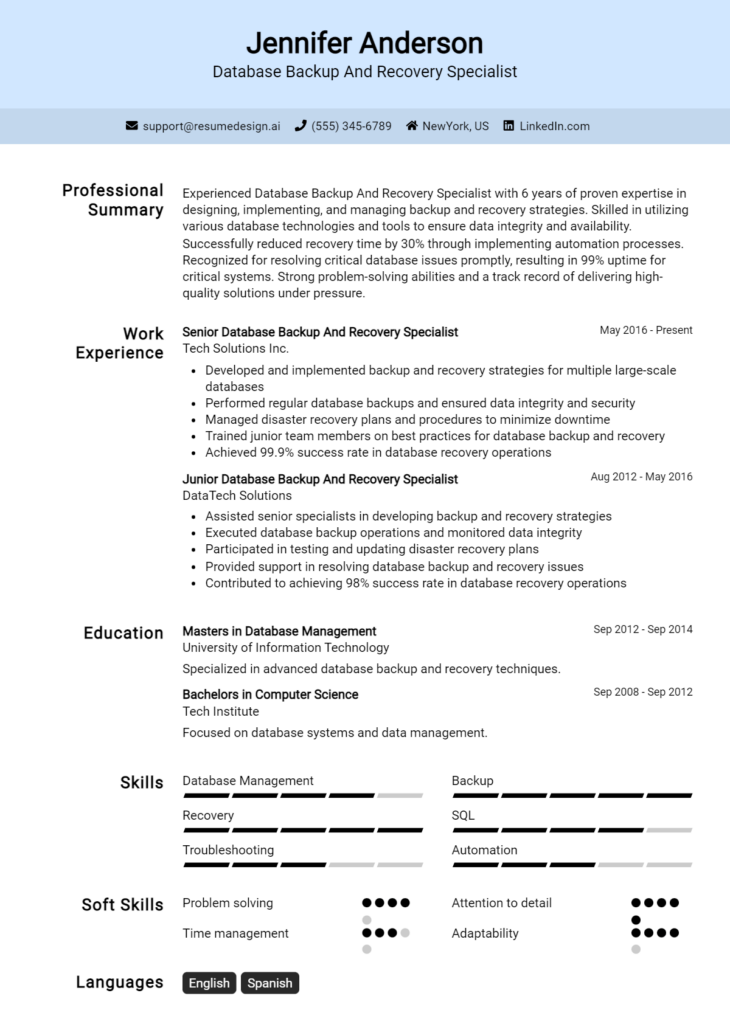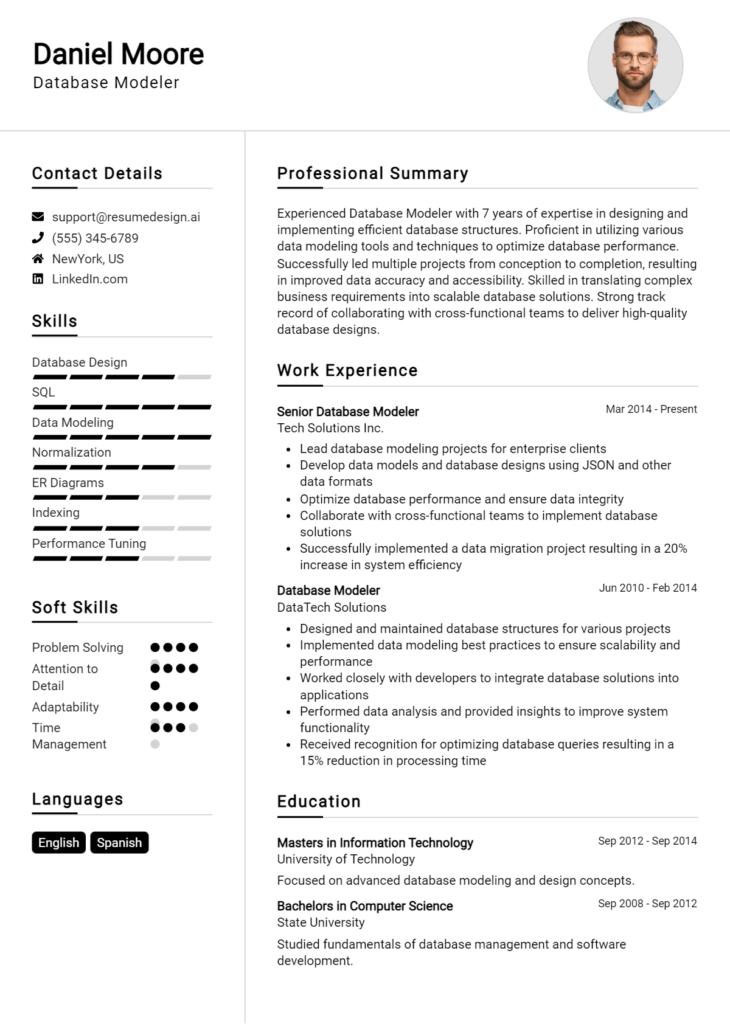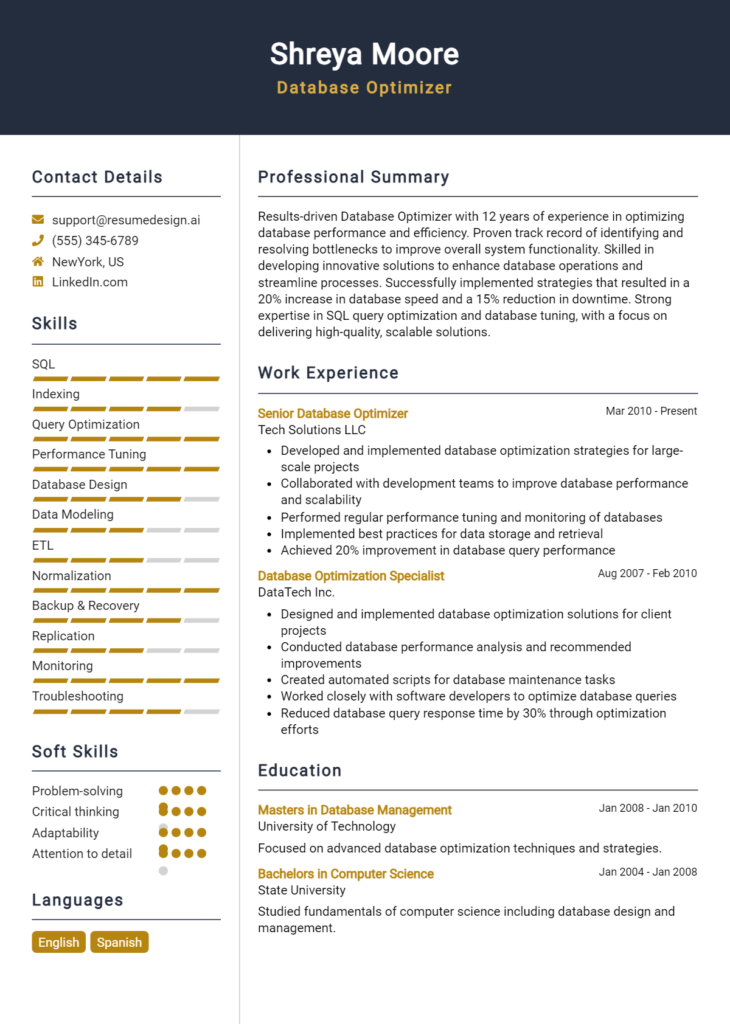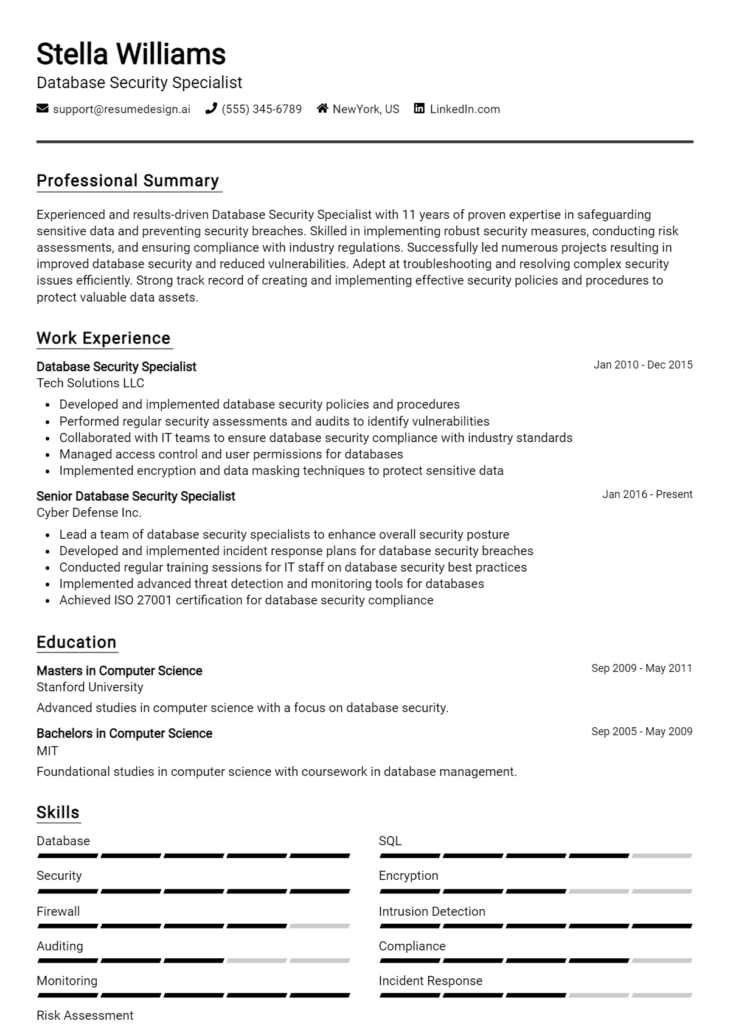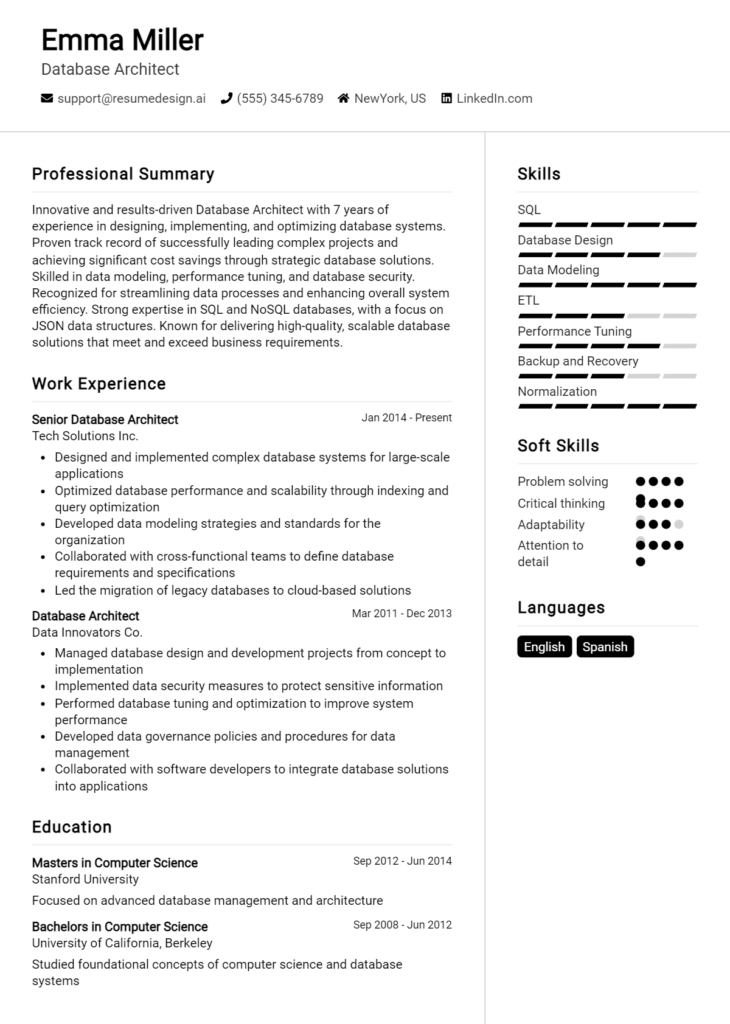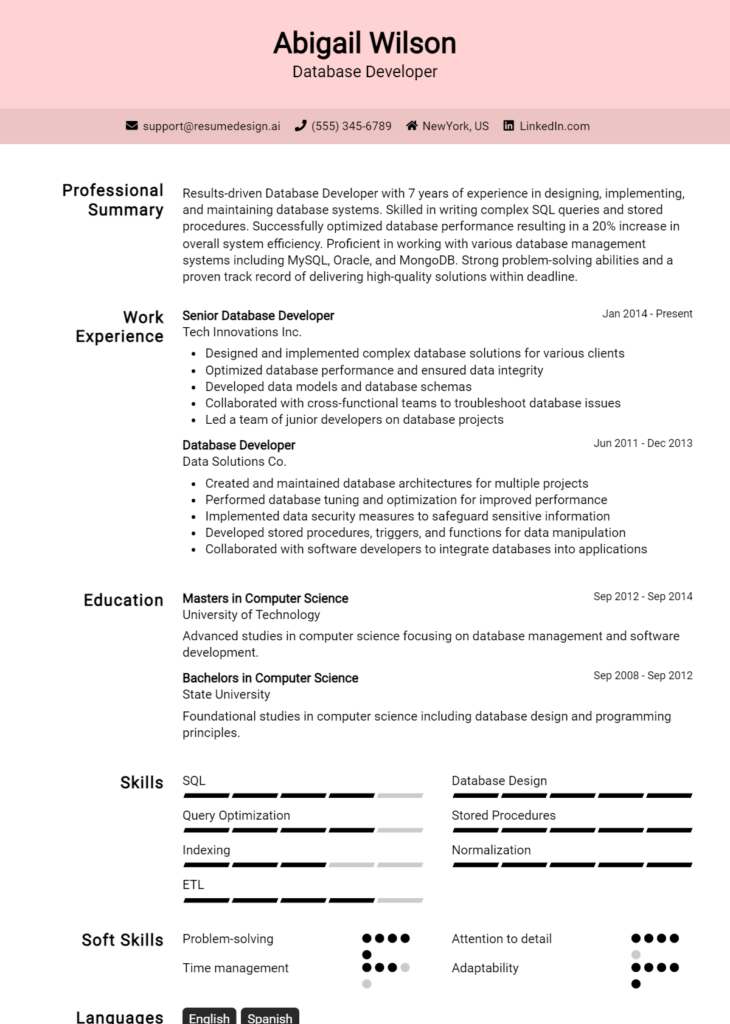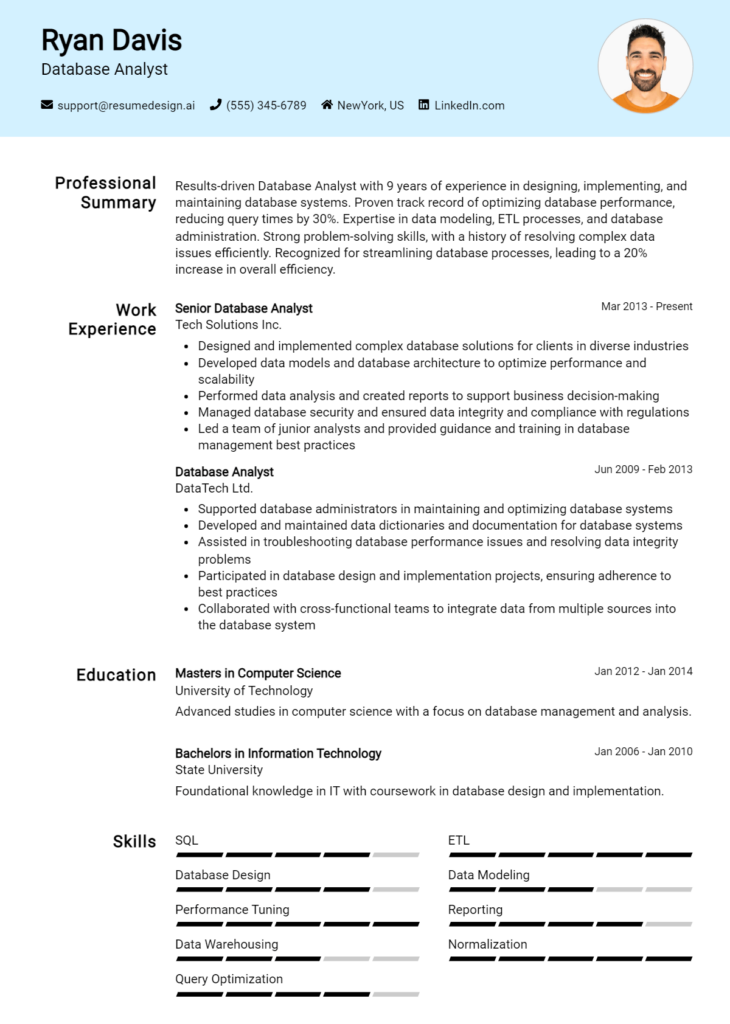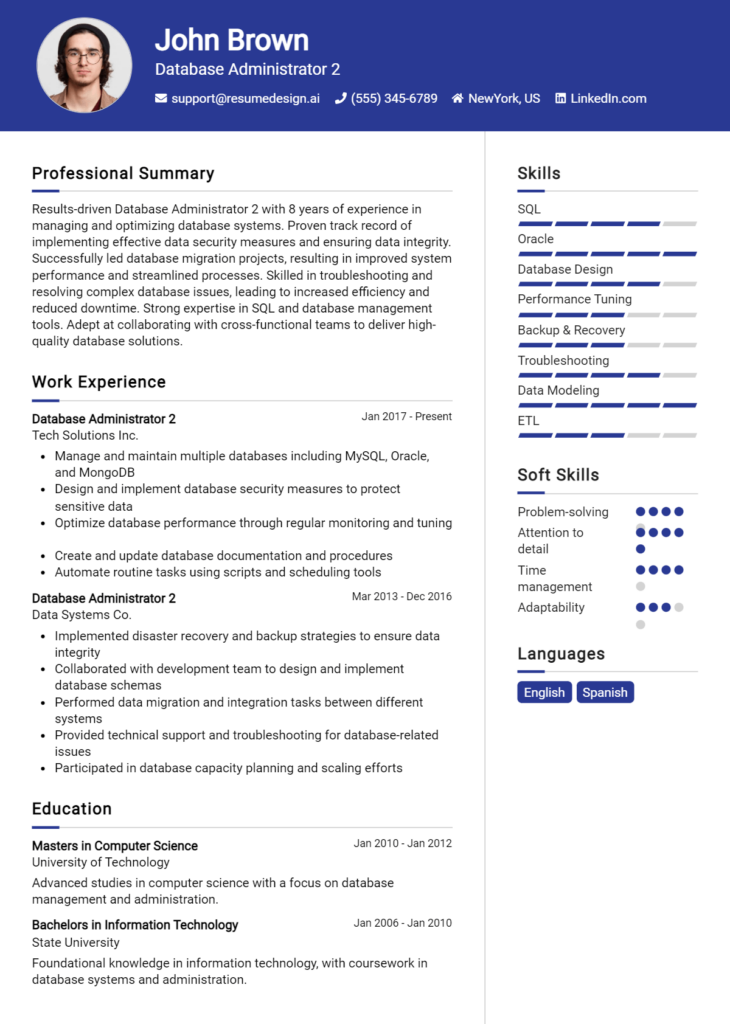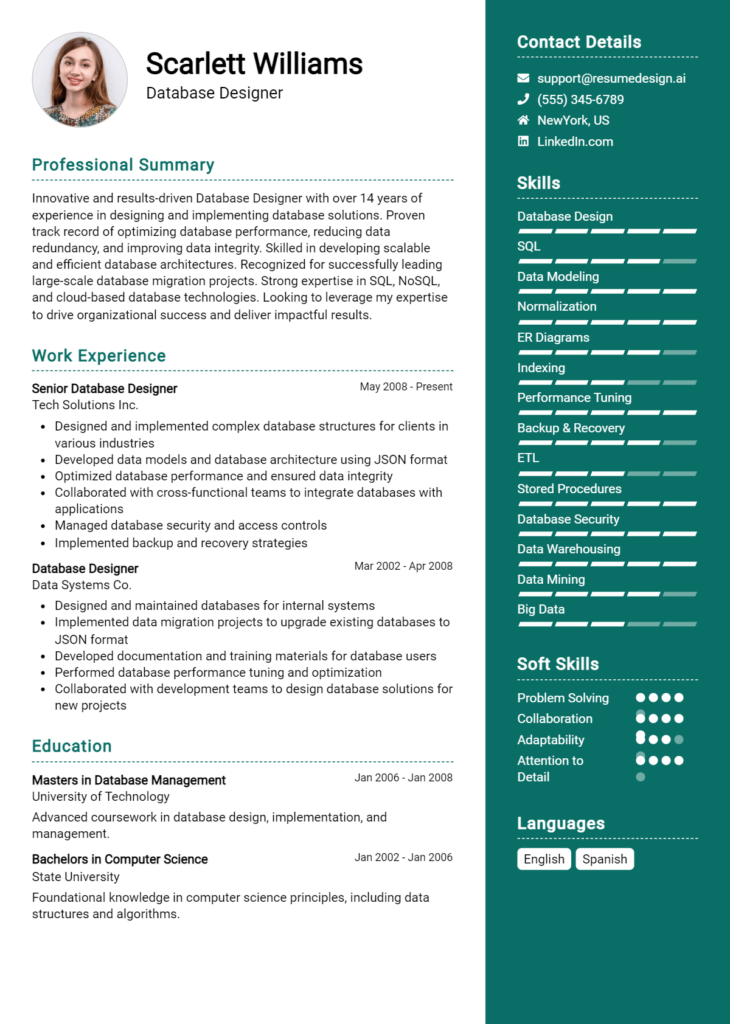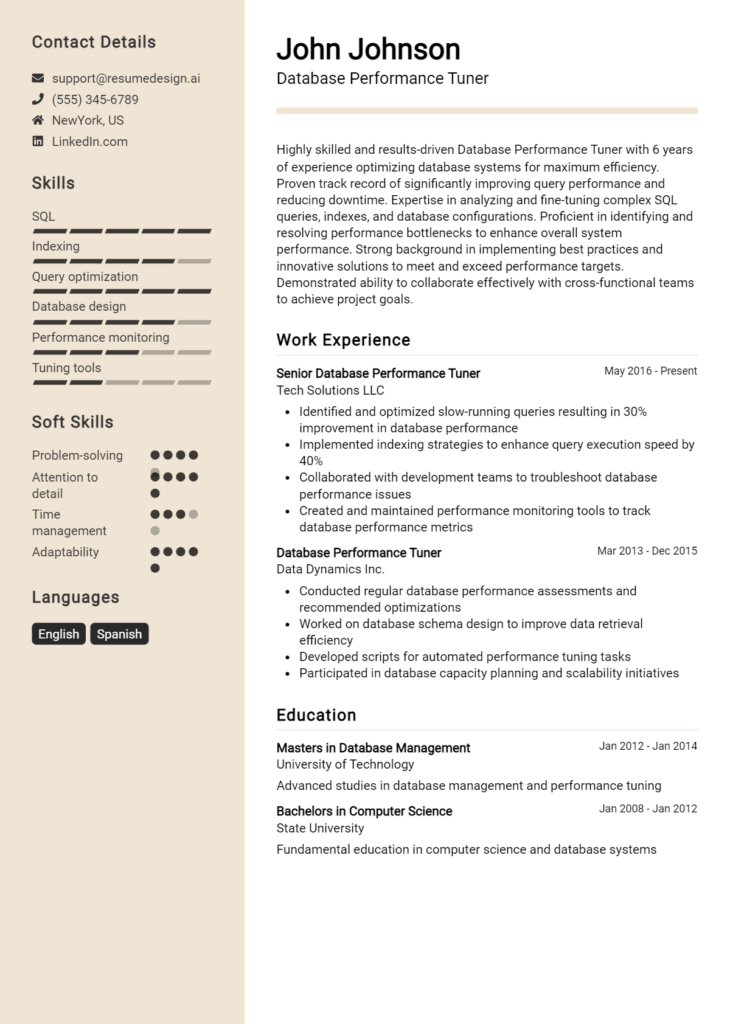Database Site Reliability Engineer Core Responsibilities
A Database Site Reliability Engineer (SRE) plays a vital role in ensuring the availability, performance, and reliability of database systems across an organization. This professional bridges the gap between development and operations, utilizing technical skills in database management, cloud services, and automation. Strong problem-solving abilities are essential for identifying and resolving issues swiftly. By showcasing these competencies in a well-structured resume, candidates can effectively demonstrate their value in achieving the organization’s operational goals and driving efficiency.
Common Responsibilities Listed on Database Site Reliability Engineer Resume
- Design and implement database architecture for scalability and performance.
- Monitor database health and performance metrics for proactive issue resolution.
- Develop automation scripts for database maintenance and deployment.
- Collaborate with development teams to optimize database queries.
- Ensure data integrity and security through regular audits and assessments.
- Manage backups, replication, and disaster recovery processes.
- Troubleshoot and resolve database-related incidents efficiently.
- Participate in capacity planning and performance tuning initiatives.
- Document operational procedures and database configurations.
- Stay updated on industry trends and best practices in database management.
- Provide technical support and guidance to cross-functional teams.
High-Level Resume Tips for Database Site Reliability Engineer Professionals
In today's competitive job market, a well-crafted resume is essential for Database Site Reliability Engineer professionals looking to make a strong impression on potential employers. Your resume often serves as the first point of contact, showcasing not only your technical skills and expertise but also your professional achievements. It's crucial to ensure that it communicates your unique value proposition effectively. This guide will provide practical and actionable resume tips specifically tailored for Database Site Reliability Engineer professionals, helping you to stand out and secure that coveted interview.
Top Resume Tips for Database Site Reliability Engineer Professionals
- Tailor your resume to the job description by incorporating relevant keywords and phrases that align with the specific role.
- Highlight your relevant experience in database management, cloud services, and infrastructure as code, ensuring it stands out.
- Quantify your achievements with measurable results, such as improved database performance by X% or reduced downtime by X hours.
- Showcase your proficiency in industry-specific tools and technologies like SQL, NoSQL, Kubernetes, and monitoring solutions.
- Include certifications relevant to database management and site reliability, such as AWS Certified Database Specialty or Google Professional Cloud Database Engineer.
- Utilize a clean, professional format that enhances readability and allows hiring managers to quickly find key information.
- Incorporate soft skills that are essential for collaboration and communication, such as problem-solving and teamwork.
- Focus on continuous learning and professional development by mentioning recent projects, workshops, or courses completed.
- Ensure your resume is free from errors and typos, as attention to detail is crucial in the field of site reliability engineering.
By implementing these tips, you can significantly increase your chances of landing a job in the Database Site Reliability Engineer field. A well-structured and tailored resume not only highlights your technical competence but also demonstrates your commitment to excellence, making it easier for employers to envision you as a valuable addition to their team.
Why Resume Headlines & Titles are Important for Database Site Reliability Engineer
In the competitive field of Database Site Reliability Engineering, a well-crafted resume headline or title serves as a crucial first impression for job seekers. This concise and impactful phrase not only grabs the attention of hiring managers but also succinctly summarizes a candidate's key qualifications and strengths. A strong headline can set the tone for the entire resume, making it clear to potential employers that the candidate possesses the skills and experience relevant to the role. It should be carefully tailored, reflecting the specific job being applied for while remaining relevant and engaging to ensure it resonates with hiring managers.
Best Practices for Crafting Resume Headlines for Database Site Reliability Engineer
- Keep it concise: Aim for a headline that is no longer than 10-15 words.
- Be role-specific: Tailor the headline to reflect the Database Site Reliability Engineer position you are applying for.
- Highlight key qualifications: Include specific skills, certifications, or experiences that are relevant to the role.
- Avoid jargon: Use clear language that can be easily understood by hiring managers.
- Showcase accomplishments: If possible, incorporate measurable achievements that demonstrate your impact.
- Use action-oriented language: Start with strong verbs to convey your proactive approach.
- Make it relevant: Align your headline with the job description to demonstrate your fit for the position.
- Stay professional: Maintain a formal tone suitable for the industry and role.
Example Resume Headlines for Database Site Reliability Engineer
Strong Resume Headlines
Innovative Database Site Reliability Engineer with 5+ Years of Experience in Optimizing Database Performance
Results-Driven Site Reliability Engineer Specializing in Database Management and High Availability Solutions
Certified Database Administrator and Site Reliability Engineer with Proven Track Record in Reducing Downtime
Expert in Cloud Database Solutions and Automation, Ensuring Seamless Operations and Scalability
Weak Resume Headlines
Database Engineer Looking for Opportunities
Experienced Professional in IT
The strong headlines are effective because they immediately convey specific skills, years of experience, and relevant accomplishments, making them memorable and impactful to hiring managers. In contrast, the weak headlines lack detail and specificity, failing to highlight the candidate's unique qualifications or the value they bring to the position. As a result, they do not capture attention or convey a compelling narrative, leaving the candidate overlooked in a pool of applicants.
Writing an Exceptional Database Site Reliability Engineer Resume Summary
A well-crafted resume summary is essential for a Database Site Reliability Engineer as it serves as the first impression a hiring manager has of a candidate. A strong summary quickly captures attention by highlighting key skills, relevant experience, and notable accomplishments tailored to the job role. It acts as a compelling introduction that sets the tone for the rest of the resume, demonstrating how the candidate is uniquely qualified for the position. By being concise and impactful, the summary effectively communicates the candidate's value proposition, encouraging the hiring manager to delve deeper into the resume.
Best Practices for Writing a Database Site Reliability Engineer Resume Summary
- Quantify achievements to showcase impact, such as improved uptime percentages or reduced incident response times.
- Focus on specific skills that are relevant to database reliability, such as performance tuning, monitoring, and automation.
- Tailor the summary to match the job description, using keywords and phrases directly from the posting.
- Highlight relevant certifications or training that enhance credibility in the field.
- Use concise language that conveys confidence and expertise without unnecessary jargon.
- Emphasize problem-solving abilities and experience with high-availability systems.
- Showcase experience with specific database technologies, such as SQL, NoSQL, or cloud-based solutions.
- Keep the summary to 2-4 sentences for maximum impact and readability.
Example Database Site Reliability Engineer Resume Summaries
Strong Resume Summaries
Detail-oriented Database Site Reliability Engineer with over 5 years of experience optimizing database performance and reliability. Successfully achieved a 99.9% uptime across multiple production environments by implementing robust monitoring solutions and automating maintenance tasks.
Results-driven professional with a proven track record of reducing database incident response time by 40% through the development of proactive alerting systems. Skilled in SQL, NoSQL, and cloud database management, ensuring high availability and scalability for mission-critical applications.
Accomplished Database Site Reliability Engineer with expertise in performance tuning and disaster recovery strategies. Spearheaded a project that improved query performance by 30%, leading to enhanced application efficiency and user satisfaction.
Innovative SRE with over 7 years of experience in database management and automation. Developed a continuous integration pipeline that reduced deployment times by 50%, significantly improving team productivity and service reliability.
Weak Resume Summaries
Database engineer with some experience in reliability. Looking for a challenging position.
Dedicated professional interested in database management and performance. I have worked on various projects and am eager to learn more.
The examples of strong resume summaries are effective because they provide specific, quantifiable results and directly align with the skills and responsibilities of a Database Site Reliability Engineer. They showcase the candidate's achievements in a way that illustrates their value to potential employers. In contrast, the weak summaries lack detail and specificity, making them generic and forgettable. They fail to convey the candidate's unique qualifications or the impact of their work, which may leave hiring managers unimpressed.
Work Experience Section for Database Site Reliability Engineer Resume
The work experience section of a Database Site Reliability Engineer (SRE) resume is crucial as it provides potential employers with a comprehensive view of the candidate's technical competencies, leadership capabilities, and the effectiveness in delivering high-quality products. This section serves as a narrative of the candidate’s journey, showcasing their expertise in database management, system reliability, and incident response. Additionally, quantifying achievements—such as improved uptime percentages or reduced incident response times—along with aligning experiences to industry standards, can significantly enhance the candidate's appeal. A well-crafted work experience section not only highlights relevant skills but also conveys the candidate's ability to work collaboratively within teams to drive organizational success.
Best Practices for Database Site Reliability Engineer Work Experience
- Focus on quantifiable achievements, such as percentage improvements in system reliability or reductions in database downtime.
- Highlight specific technical skills and tools used, such as SQL, NoSQL databases, monitoring tools, or automation frameworks.
- Emphasize collaborative projects that required teamwork and communication with cross-functional teams.
- Describe leadership roles or initiatives taken, particularly in mentoring junior engineers or leading incident response efforts.
- Use industry-standard terminology and metrics to align your experience with current best practices.
- Include challenges faced and how you overcame them to demonstrate problem-solving abilities.
- Tailor your experiences to match job descriptions, ensuring relevance to the prospective employer.
- Maintain clarity and conciseness, avoiding jargon that may confuse readers.
Example Work Experiences for Database Site Reliability Engineer
Strong Experiences
- Led the migration of a legacy database system to a cloud-based solution, resulting in a 30% reduction in operational costs and improved scalability.
- Implemented automated monitoring and alerting systems that decreased incident response time by 50%, enhancing overall system reliability.
- Collaborated with development teams to optimize query performance, achieving a 40% increase in application efficiency.
- Mentored a team of five junior database administrators, fostering skills in performance tuning and incident management, which led to a 25% improvement in team performance metrics.
Weak Experiences
- Worked on database-related tasks, occasionally fixing issues when they arose.
- Participated in team meetings and contributed to discussions about database performance.
- Helped with database backups and maintenance without specifying the impact on the team or system.
- Assisted in various projects related to database management without detailing specific achievements or roles.
The examples above illustrate the distinction between strong and weak experiences. Strong experiences are characterized by specific, quantifiable outcomes, demonstrating the candidate's technical leadership and collaborative skills. They provide clear evidence of the candidate's impact on the organization, with measurable results that align with the expectations of a Database Site Reliability Engineer. Conversely, weak experiences lack detail and specificity, failing to convey the candidate's contributions or the importance of their work, which may leave employers questioning their capabilities and fit for the role.
Education and Certifications Section for Database Site Reliability Engineer Resume
The education and certifications section of a Database Site Reliability Engineer resume is crucial for showcasing a candidate's academic background and professional qualifications. It highlights the candidate's commitment to continuous learning and staying updated with industry standards. By including relevant coursework, industry-recognized certifications, and specialized training, this section significantly enhances the candidate's credibility and demonstrates their alignment with the specific requirements of the job role. Employers often look for evidence of a solid educational foundation and ongoing professional development to ensure that candidates possess the necessary skills and knowledge to excel in a dynamic and demanding field.
Best Practices for Database Site Reliability Engineer Education and Certifications
- Prioritize relevancy by including degrees and certifications that directly relate to database management, cloud technologies, and reliability engineering.
- Be specific about your coursework, especially if it pertains to database systems, distributed systems, or site reliability engineering.
- Highlight advanced certifications from recognized organizations, such as AWS Certified Database Specialty or Google Professional Data Engineer.
- Include any specialized training or boot camps that offer hands-on experience with relevant technologies.
- Use clear formatting to separate different types of credentials and make the section easy to read.
- List the most recent and relevant qualifications first to capture the employer's attention.
- Consider including continuing education credits or workshops that demonstrate a commitment to professional growth.
- Remove outdated or irrelevant qualifications to keep the focus on what is most applicable to the role.
Example Education and Certifications for Database Site Reliability Engineer
Strong Examples
- B.S. in Computer Science, University of Technology, 2022
- AWS Certified Database Specialty, 2023
- Google Professional Data Engineer, 2023
- Coursework in Database Systems and Site Reliability Engineering, Online University, 2021
Weak Examples
- B.A. in History, State University, 2019
- Microsoft Office Specialist Certification, 2018
- Oracle 10g Certified Professional, 2015
- Coursework in Creative Writing, Community College, 2020
The strong examples are considered effective because they reflect a direct relevance to the skills and knowledge required for a Database Site Reliability Engineer role, showcasing up-to-date certifications and applicable coursework. In contrast, the weak examples demonstrate a lack of connection to the position's requirements, featuring outdated certifications and degrees that do not align with the technical competencies needed in the field.
Top Skills & Keywords for Database Site Reliability Engineer Resume
In the ever-evolving landscape of technology, the role of a Database Site Reliability Engineer (SRE) is crucial for ensuring that database systems are robust, reliable, and efficient. A well-crafted resume that highlights the right skills can make a significant difference in showcasing your qualifications to potential employers. Skills not only demonstrate your technical proficiency but also reflect your ability to collaborate, solve problems, and adapt to changing environments. As organizations increasingly rely on data-driven decision-making, having a solid foundation of both hard and soft skills is essential for success in this role.
Top Hard & Soft Skills for Database Site Reliability Engineer
Soft Skills
- Problem-solving
- Team collaboration
- Effective communication
- Adaptability
- Critical thinking
- Attention to detail
- Time management
- Customer-oriented mindset
- Conflict resolution
- Stress management
Hard Skills
- Database management systems (e.g., MySQL, PostgreSQL, Oracle)
- Cloud platforms (e.g., AWS, Azure, Google Cloud)
- Scripting languages (e.g., Python, Bash, Ruby)
- Monitoring and logging tools (e.g., Prometheus, Grafana)
- Configuration management (e.g., Ansible, Chef)
- SQL and NoSQL database design
- Performance tuning and optimization
- Backup and recovery strategies
- High availability and disaster recovery solutions
- Knowledge of DevOps practices
By emphasizing these skills on your resume, along with relevant work experience, you can significantly enhance your candidacy for a Database Site Reliability Engineer position.
Stand Out with a Winning Database Site Reliability Engineer Cover Letter
Dear [Hiring Manager's Name],
I am writing to express my interest in the Database Site Reliability Engineer position at [Company Name], as advertised on [Job Board/Company Website]. With a solid foundation in database management, cloud technologies, and a passion for ensuring system reliability, I am excited about the opportunity to contribute to your team. My experience in implementing database solutions and optimizing performance aligns well with the responsibilities of this role, and I am eager to bring my skills to enhance the reliability and availability of your data systems.
In my previous role at [Previous Company Name], I successfully led a team of engineers in transitioning our database infrastructure to a cloud-based solution, which improved our system uptime by 30%. I have hands-on experience with various database technologies, including MySQL, PostgreSQL, and MongoDB, and I am proficient in automation tools such as Terraform and Ansible. My commitment to best practices in monitoring and incident response has enabled me to create robust systems that minimize downtime and provide seamless service to our users. I thrive in collaborative environments and believe that effective communication is key to achieving high reliability and performance in complex systems.
I am particularly impressed by [Company Name]'s commitment to innovation and continuous improvement in database management. I am eager to contribute my technical expertise and proactive approach to reliability engineering to help further enhance your systems. I look forward to the possibility of discussing how my background, skills, and enthusiasms align with the goals of your team. Thank you for considering my application.
Sincerely,
[Your Name]
[Your LinkedIn Profile]
[Your Contact Information]
Common Mistakes to Avoid in a Database Site Reliability Engineer Resume
When crafting a resume for a Database Site Reliability Engineer (SRE) position, it's essential to present your skills, experience, and knowledge effectively. However, many candidates make common mistakes that can hinder their chances of landing an interview. Avoiding these pitfalls can significantly enhance your resume's impact and showcase your suitability for the role. Here are some frequent errors to watch out for:
Lack of Tailoring: Failing to customize your resume for the specific job description can make you seem uninterested or unqualified. Always align your skills and experiences with the requirements outlined in the job posting.
Overlooking Soft Skills: While technical skills are crucial, neglecting to highlight soft skills like communication, teamwork, and problem-solving can lead to a less compelling resume. Site Reliability Engineers often work collaboratively, so showcasing these abilities is essential.
Vague Job Descriptions: Providing generic responsibilities without quantifiable achievements can weaken your resume. Instead, use specific metrics and results to demonstrate your impact in previous roles.
Ignoring Industry Terminology: Using outdated or irrelevant terms can make your resume appear unprofessional. Stay updated on current technology and industry jargon to ensure your expertise is recognized.
Neglecting Continuous Learning: Failing to mention ongoing education, certifications, or relevant training can suggest a lack of commitment to professional development. Highlight any recent courses or certifications that enhance your qualifications.
Poor Formatting: A cluttered or overly complicated resume layout can distract from your accomplishments. Use a clean, organized format with clear headings and bullet points to improve readability.
Lengthy Descriptions: Being overly verbose can detract from your key skills and achievements. Aim for concise descriptions that convey your experience without unnecessary details.
Omitting Relevant Tools and Technologies: Not listing the database management systems, tools, and technologies you are proficient in can be a critical oversight. Make sure to include all relevant software and platforms that demonstrate your technical capabilities.
Conclusion
As a Database Site Reliability Engineer, your role is crucial in ensuring the smooth and efficient operation of databases within an organization. Throughout this article, we've explored the essential skills, responsibilities, and best practices that define this position. Key points include:
- Technical Expertise: Proficiency in database management systems, performance tuning, and troubleshooting is vital.
- Automation Skills: Leveraging automation tools to enhance database reliability and reduce manual intervention.
- Monitoring and Incident Response: Implementing robust monitoring systems and having a clear incident response plan to maintain uptime.
- Collaboration: Working closely with development teams to optimize database performance and ensure seamless integration with applications.
- Continuous Improvement: Emphasizing a culture of continuous improvement to adapt to evolving technologies and methodologies.
As you reflect on your career as a Database Site Reliability Engineer, it’s essential to ensure your resume effectively highlights your skills and experiences. We encourage you to take advantage of various resources available to you, such as resume templates, a resume builder, and resume examples that can help you create a compelling document. Additionally, consider utilizing cover letter templates to complement your resume. By updating your resume with these tools, you can position yourself as a strong candidate in the competitive job market. Take the next step in your career today!

